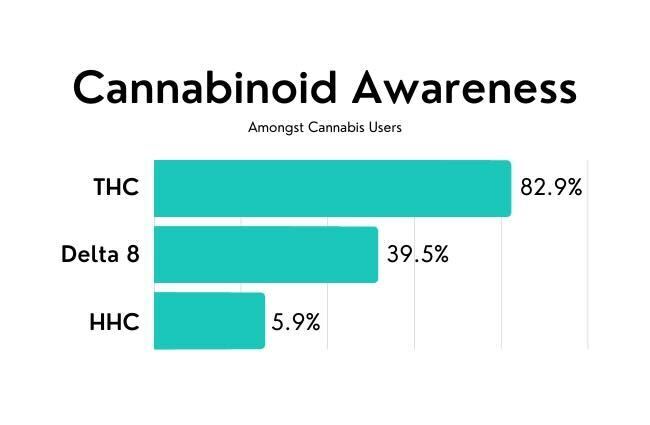HHC vs THC
Among the slew of new cannabinoids flooding the cannabis market, HHC remains one of the more unknown compounds. With the rapid rise of hemp-derived cannabinoids and its seemingly endless versions of compounds, it is more important than ever to understand the pros and cons of each. What is HHC? What’s the difference between HHC, Delta-8 and THC? We’re diving deep into the data to break down everything you may need to know about the one of the newer hemp-derived cannabinoids.
What is HHC?
Hemp-derived cannabinoids are a group of related compounds extracted from cannabis plants. They classify as hemp-derived because they all have less than 0.3% THC levels in them. Known by its chemical name hexahydrocannabinol, HHC is a naturally occurring cannabinoid in hemp plants but one that occurs in very trace amounts which makes commercial organic production non-viable. This scarce compound can now be semi-synthesized from the likes of THC through chemical reactions and is sought for its non-psychoactive, yet positive mood effects in humans.
American chemist Roger Adams is the first to discover HHC in 1948. Through a process known as hydrogenation, he was able to convert delta-9 THC into a new compound known as HHC by adding two hydrogen molecules. This fundamentally altered the psychoactive properties of the THC into a less potent but equally desirable HHC compound. Today, a lot of other cannabinoids like delta-8 can also be converted into HHC through similar synthetic processes.
Effects of HHC
The main attraction of HHC to users is that, unlike THC, it will not get you high in the same way. It is less potent than THC and delta-8 and is also known to be much more stable than THC because of its hydrogenated composition, thus giving it longer shelf life. HHC is however known to boost happiness, calmness, increase energy, and overall positive mind frame for the user.
HHC vs THC
So how does HHC vs THC debate goes when it comes to consumer acceptance? A survey of 3000 cannabis product users asking the audience which products they’ve heard of showed that an overwhelming majority (82.9%) of respondents heard of THC while only 5.9% had previously heard of HHC. Even Delta-8 is much more well-known than HHC as 39.5% of respondents said they had heard of it before.

This cannabinoid awareness data from Brightfield Group is a clear indicator of the relative market sizes of HHC and THC. HHC is relatively new on the cannabinoid trend wagon, as it only just recently began to capture headlines and strike conversations in the CBD communities around the world. Although THC is mostly illegal, one can safely assume that its market share is much larger than HHC. However, with more research and education on the effects of HHC, experts predict that consumer awareness and eventually the market for HHC will experience rapid growth in the times ahead.
HHC vs Delta-8
Delta-8 is a close relative of delta-9 THC. It is more easily produced, more abundant, and better known among CBD users. Delta-8 has more potent psychoactive effects than HHC, but it is significantly lower than that of full-blown THC.
Both HHC and Delta-8 are legal in 38 states of the United States, unlike THC which is only legal for recreational use in 21 states. Despite its relaxed legal status thanks to its less than 0.3% THC composition, HHC is much scarcer because it is new on the commercial market and much harder to produce. Delta-8 is the cheapest among the three and very abundant in the market, while THC is still more readily available than HHC.
The Future of Hemp-derived cannabinoids
The hemp-derived cannabinoids market is only warming up as market size is predicted to grow from $5 billion in retail sales in 2022 to $11 billion by 2027. Although there are still significant challenges such as the FDA’s reluctance to issue full industry-wide regulatory approval, the forward thrust is not losing its momentum as state-level campaigns and legislative approval routes continue to make steady progress. One can safely say that the hemp-derived cannabinoids industry will continue to surmount challenges and flourish in the long term.
Is HHC safe?
Although there are no definitive peer-reviewed findings on the specific safety of HHC, it is widely accepted that HHC is the less potent cannabinoid when compared to THC and delta-8. It is however important to note that since most HHC is synthetically made, the mode of creation could have some undesired side effects for certain people.
Is HHC legal?
HHC is only coming on the public radar recently and there is no specific legislation anywhere in the US on it. However, as it contains less than 0.3% THC in it, that makes it a legal cannabinoid in the 38 states where delta-8 is currently legal. Most users currently use the delta-8 framework as the guardrail to the legality of HHC until lawmakers create more specific legal guidelines.
Market challenges
THC and delta-8 became famous because of their underground notoriety and later legal to semi-legal status. HHC faces a particular challenge in that it is relatively new and is not yet as well-known as either THC or delta-8. In addition to its low recognizability, the high cost of producing HHC also means that retail prices are relatively high compared to other cannabinoids. This poses a particular challenge for industrial-scale production which could mean that demand might continue to outpace supply until more effective production methods are devised.
For more high-quality content on hemp-derived cannabinoids and other amazing wellness content, sign up for the Brightfield Group newsletter to be the first to act on upcoming trends.




